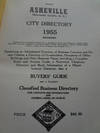
Spontaneous Fission of Uranium, Physical Review 58, 1, July 1, 1940
by Flerov, G. N. [Flyorov] & Petrzhak, K. A. [Petrjak, Pietrzak]
- Used
- Paperback
- first
- Condition
- See description
- Seller
-
West Branch, Iowa, United States
Payment Methods Accepted
About This Item
Lancaster: American Institute of Physics, 1940. 1st Edition. FIRST EDITION IN ORIGINAL PRINTED WRAPS OF THE FIRST OBSERVATION OF SPONTANEOUS FISSION. Spontaneous fission is a type of radioactive decay in which certain unstable nuclei of heavier elements split into two nearly equal fragments (of lighter elements) and in so doing liberate a large amount of energy.
In 1938, Otto Hahn and the nuclear chemist Fritz Strassmann discovered nuclear fission, the discovery of fission by neutrons [We offer that paper separately]. "They demonstrated the presence of radioactive barium, lanthanum and cesium among the products of neutron bombardment of uranium-a phenomenon that seemed to contradict all previous experiences of nuclear physics" (Norman). It was left to Meitner and Frisch to explain the phenomena and introduce the term nuclear fission. [We also offer that paper separately].
Flerov and Petrzhak were asked by the Soviet nuclear physicist Igor Kurchatov, later known as the father of the Soviet atomic bomb, to repeat Hahn and Strassmann's experiments and verify the results. Their "investigation brought about determining the number of secondary fission neutrons; isolating uranium-235 as a fissile isotope; and, finally discovering the spontaneous fission of uranium-238" (Wikipedia).
In 1942, Flerov wrote Stalin to point out that despite the publication of this 1940 paper, the United States, Great Britain, and Germany were all silent on the subject of nuclear fission - a silence which then convinced the Russians that the Americans themselves were at work on a bomb. "Flerov's urgings to "build the uranium bomb without delay" eventually led to the development of the Soviet atomic bomb project" (Wikipedia). CONDITION & DETAILS: Lancaster: American Institute of Physics. 4to. 10.5 x 7.75 inches (262 x 194mm). Bright and clean inside and out. Housed in a gilt-lettered clamshell case. Fine condition.
In 1938, Otto Hahn and the nuclear chemist Fritz Strassmann discovered nuclear fission, the discovery of fission by neutrons [We offer that paper separately]. "They demonstrated the presence of radioactive barium, lanthanum and cesium among the products of neutron bombardment of uranium-a phenomenon that seemed to contradict all previous experiences of nuclear physics" (Norman). It was left to Meitner and Frisch to explain the phenomena and introduce the term nuclear fission. [We also offer that paper separately].
Flerov and Petrzhak were asked by the Soviet nuclear physicist Igor Kurchatov, later known as the father of the Soviet atomic bomb, to repeat Hahn and Strassmann's experiments and verify the results. Their "investigation brought about determining the number of secondary fission neutrons; isolating uranium-235 as a fissile isotope; and, finally discovering the spontaneous fission of uranium-238" (Wikipedia).
In 1942, Flerov wrote Stalin to point out that despite the publication of this 1940 paper, the United States, Great Britain, and Germany were all silent on the subject of nuclear fission - a silence which then convinced the Russians that the Americans themselves were at work on a bomb. "Flerov's urgings to "build the uranium bomb without delay" eventually led to the development of the Soviet atomic bomb project" (Wikipedia). CONDITION & DETAILS: Lancaster: American Institute of Physics. 4to. 10.5 x 7.75 inches (262 x 194mm). Bright and clean inside and out. Housed in a gilt-lettered clamshell case. Fine condition.
Reviews
(Log in or Create an Account first!)
Details
- Bookseller
- Atticus Rare Books
(US)
- Bookseller's Inventory #
- 1115
- Title
- Spontaneous Fission of Uranium, Physical Review 58, 1, July 1, 1940
- Author
- Flerov, G. N. [Flyorov] & Petrzhak, K. A. [Petrjak, Pietrzak]
- Book Condition
- Used
- Quantity Available
- 1
- Edition
- 1st Edition
- Binding
- Paperback
- Publisher
- American Institute of Physics
- Place of Publication
- Lancaster
- Date Published
- 1940
Terms of Sale
Atticus Rare Books
30 day return guarantee, with full refund including shipping costs for up to 30 days after delivery if an item arrives misdescribed or damaged.
About the Seller
Atticus Rare Books
Biblio member since 2010
West Branch, Iowa
About Atticus Rare Books
We specialize in rare and unusual antiquarian books in the sciences and the history of science. Additionally, we specialize in 20th century physics, mathematics, and astronomy.
Glossary
Some terminology that may be used in this description includes:
- Fine
- A book in fine condition exhibits no flaws. A fine condition book closely approaches As New condition, but may lack the...
- First Edition
- In book collecting, the first edition is the earliest published form of a book. A book may have more than one first edition in...

